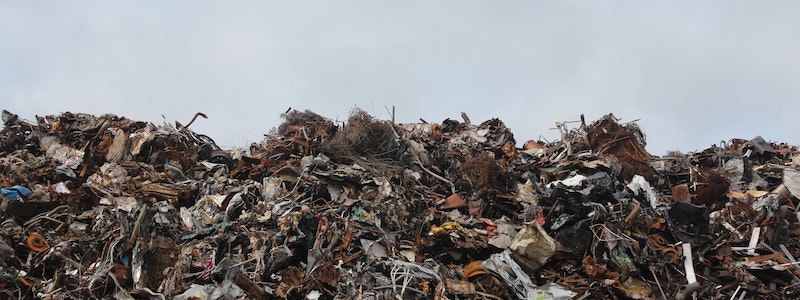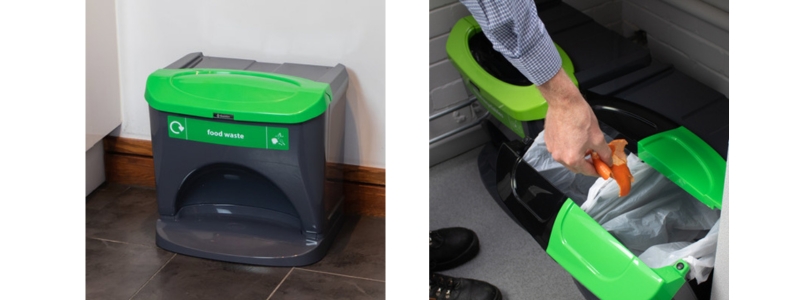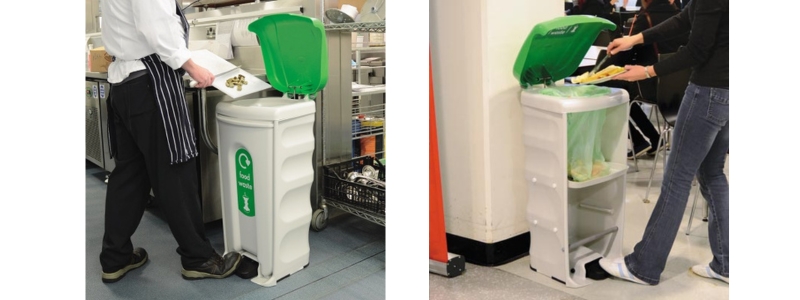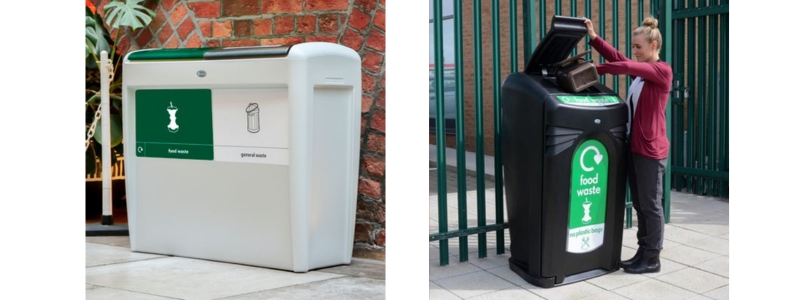With one-third of all food produced for human consumption wasted each year, it's clear that action needs to be taken. Not only does food waste have negative environmental impacts, but it also has social and economic consequences. So, what can be done about it?

What is Food Waste?
The United Nations Food and Agricultural Organisation (FAO) states –
“Food waste refers to the discard of edible foods at the retail and consumer levels, mostly in developed countries.”*
This can be any edible product or by-product that is intended for human consumption but is discarded or expired; this can come from a wide variety of sources, such as:
- Prepared, perfectly edible food that has not been eaten.
- Unsold food from local markets or other retail outlets such as produce food.
- Plate waste from restaurants.
- Trimmings like food scraps from food preparation in restaurants, cafeterias, or homes; and by-products of food and beverage processing.
- By-products of industrial food/beverage processing.
What is the Impact of Food Waste?
Globally, food waste causes substantial economic, social and, of course, environmental ramifications.
The U.N 2021 Food Waste Index recently revealed that a staggering 1.3 billion tonnes of food are wasted every year, costing the global economy around $750 billion and contributing 8-10% to the world's greenhouse gas emissions.*
Roughly a third of the world's food is wasted.*
The UK is responsible for generating the most food waste in Europe, amounting to an astronomical total of 9.52 million tonnes per annum. Tragically, at the same time, over 13 million people are living in food poverty when 3 million tonnes of this surplus food remains edible - that's enough for 7 billion meals!* Economically, this wastage costs the country £19 billion annually, however, the environment takes the worst hit as all this waste emits 25 million tonnes of greenhouse gases every year.*
Without reliable waste disposal techniques and stringent food waste regulations, a large proportion of food waste will inevitably be discarded in landfills. Here, food naturally decays, and one of the major side-effects of decomposing food in landfills is the generation of methane – a noxious greenhouse gas that's 25 times more potent than carbon dioxide exacerbating climate change 80 times faster.*

What is Being Done?
As part of the United Nation’s Sustainable Development Goals (SDG), Goal 12 "Ensure sustainable consumption and production patterns" aims to halve global food waste and reduce food losses in production and supply by 2030. It aims to do this through cooperation and global partnerships between multiple agencies and across a broad range of areas.
Meanwhile, the European Commission has announced the Farm2Fork strategy to make food production and consumption more sustainable. It plans to do this by proposing binding targets to reduce food waste in EU member countries and by integrating food waste prevention guidelines into existing policies, with the intention of reducing food waste per capita by 50 % by 2030.
In the UK; in adherence with the UN's sustainable development goals, the UK Government has committed to halving the country's per capita food waste by 2030.* It seeks to do this through various initiatives and campaigns.
The Environment Act 2021 has brought new requirements for UK businesses when it comes to food waste, obligating them to take additional measures if they dispose of more than 5KG each week. Instead of throwing out into general waste bins, dedicated bins must now be provided - this regulation is already being implemented in Scotland and Northern Ireland, with England and Wales following suit before the end of 2023.*
The Food Waste Reduction Roadmap, a combined venture of WRAP and the Institute of Grocery Distribution (IGD), was established in 2018 to create milestones for reducing edible food waste in the UK. Some of the UK's largest retailers, producers and manufacturers have all committed to the milestones laid out in the Roadmap. Fundamentally, it allows businesses to measure and report consistently and helps food businesses take targeted action to reduce their own waste across all their operations. As of now, 261 organisations have committed to the roadmap - 16 retail outlets, 162 producers/manufacturers, and 35 hospitality/food service establishments.*
The Courtauld Commitment 2030 is a voluntary agreement set up by WRAP and supported by the UK Government through the Resource and Waste Strategy. It enables the entire UK food chain to deliver farm-to-fork reductions in food waste and help the UK food and drink sector achieve global environmental goals.* A 2022 Progress and Insights report highlighted an achievement of a 12% reduction in greenhouse gas emissions in UK food and drink consumption since 2015.
Whilst initiatives are in place to combat food waste, it's up to us to change our habits and make not wasting food a way of life.
How to Reduce Food Waste as an Organisation
One of the most effective ways to reduce food waste as an organisation is to follow the Food Waste Recovery Hierarchy; the tiered system of guidance is for any business or organisation which produces, handles, treats, or disposes of surplus food and drink. It ranks food waste management options according to what is best for the environment, prioritising prevention and redistributing surplus food above everything.
Following this hierarchy can be a long-term process, however, there are some quick and effective techniques that organisations of all sizes can implement immediately. Here are just a few examples.
Create a Food Hub. To start, set up an area solely designated to supply, consume and dispose of food. Ensure these locations are maintained in tip-top condition and can accommodate a welcoming setting where staff want to eat, socialise and most importantly; be educated on recycling their food waste.
Implementing the Right Solutions. Dedicated bins to capture food waste are essential if your organisation is seeking to improve disposal rates. Glasdon offers a vast range of Food Waste Recycling Bins designed with hygiene, practicality and engagement at the forefront of their design.
Raise Awareness. Ensure that every member of staff has access to the most recent information, explain how to dispose correctly, and motivate them by showing how beneficial it can be. To reinforce this knowledge, posters & infographics or team-based activities can help to demonstrate the rewards of a successful food recycling programme in the workplace.

Start Composting. Instead of letting food scraps go to waste, organisations should opt to compost organics to create nutrient-rich, healthy soil that other businesses can use for their own agricultural purposes like fertiliser or animal feed. Such things as raw or cooked vegetables and fruits and, coffee grounds and tea bags are all able to be turned into compost.
This is Where We Come In..
While prevention policies and responsible consumption techniques are the most effective means of tackling the food waste problem in both households and businesses, there is still more to be done in terms of capture and disposal.
Composting not only benefits the environment directly but also helps reduce waste entering landfills. This way of food waste recycling is hugely popular in many countries across Europe.
Glasdon offers practical solutions to collect food waste for conversion into compost. Our Food Waste Recycling Bins have been specially designed to be used in various sectors of the food industry including commercial restaurants and food courts, but can be easily integrated into any workplace or home.

Glasdon Food Waste Recycling & Compost Bins
Notable Design Features –
- Aperture flaps to lock in and contain odours.
- Lid-operated foot pedals to improve hygienic disposal.
- Large apertures to guide waste.
- Recognisable decals to make them easily identifiable.
- Durable materials to ensure long service life.
The Nexus® Stack can be used both in the office and at home to separate food waste from other waste streams like food packaging.

Products such as Nexus® Shuttle are suitable for food preparation areas such as kitchens and cafes.

Nexus® Evolution can be equipped with a compartment to separate waste streams for spaces such as cafeterias and Nexus® City selective sorting wheelie bin housing can serve as larger collection points for food waste in external locations.

If you would like to learn more about how Glasdon can help with your waste management, please Contact Us today.
References
*https://www.unep.org/resources/report/unep-food-waste-index-report-2021
*https://www.unep.org/regions/north-america/regional-initiatives/promoting-sustainable-lifestyles
*https://news.un.org/en/story/2013/09/448652
*https://www.theecoexperts.co.uk/home-hub/food-waste-facts-and-statistics#:~:text=Greenhouse%20gas%20emissions,food%20that's%20simply%20thrown%20away.
*https://fareshare.org.uk/what-we-do/hunger-food-waste/
*https://www.edf.org/climate/methane-crucial-opportunity-climate-fight#:~:text=Methane%20has%20more%20than%2080,warming%20in%20the%20near%20term.
*https://lordslibrary.parliament.uk/food-waste-in-the-uk/
*https://wrap.org.uk/taking-action/food-drink/initiatives/food-waste-reduction-roadmap
*https://www.freeths.co.uk/2023/04/17/mandatory-separate-food-waste-segregation-for-all-businesses-set-to-come-into-force-from-2023/



























